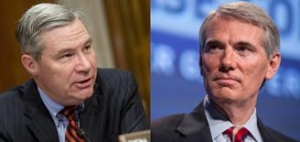The weekly report on US and World Public Policy
by Edwina Rogers
New Secular Policy Institute Resources
 New SPI guides have been added to our library of resources:
New SPI guides have been added to our library of resources:
- Religiousness by US State
- Religiousness by US Country
- Deadlines to submit resolutions to US State politicians
German Minister of Foreign Affairs
Frank-Walter Steinmeier, the German Minister of Foreign Affairs, will speak in Washington┬áon Thursday┬áon the importance of transatlantic unity during a time of heightened geopolitical uncertainty. From the ongoing crisis in Ukraine and┬áthe rise of the Islamic State to the intensification of negotiations over Iran’s nuclear program, transatlantic policy unity has been indispensable but cannot be taken for granted.┬á As these international challenges┬ámultiply and intensify in the coming weeks and months,┬áthe United States and Europe must overcome their own domestic political and economic challenges to┬átake┬ádecisive action as the international legal order comes under increasing strain.┬á┬áHow will U.S. and German foreign and security policies adapt to this complex security environment?┬áWill transatlantic unity be maintained and renewed or will transatlantic divisions and differences be┬áexacerbated?┬á Will the U.S. return┬áto its traditional role as an engaged European power or will it support greater┬áEuropean leadership in Europe in order to prioritize its┬ápolicy interests in Asia and the Middle East? SPI’s Edwina Rogers was invited to this meeting to be held┬áon Thursday March 12, 2015.
President Obama
This week President Obama┬áspoke in Selma, Alabama, at an event marking the 50th anniversary of what’s known as “Bloody┬áSunday.” Hundreds of civil rights protesters were attacked by state troopers as they marched from Selma to Montgomery in 1965 to protest racial discrimination in voter registration. SPI supports the President in his remarks.
US Congress
The Senate is currently on consideration of┬áS. 178, the Justice for Victims of Trafficking Act. There is an open amendments process on this legislation throughout the week. SPI signed a letter to Congress requesting ┬áthat religious refusals not be allowed in this legislation. ┬áReligious providers that receive federal funds to treat victims will often refuse to offer the very services they need most – abortion and contraceptive services.
Looking Ahead
Legislative items that are possible during this work period include: Anti-Trafficking legislation, Nominations, and the Budget Resolution.
SPI Hill Meetings
 SPI Staff had meetings with the following offices: Senator Portman, Senator Whitehouse and Representative Scott. These meetings varied in topics surrounding separation of government and religion and promotion of science.
SPI Staff had meetings with the following offices: Senator Portman, Senator Whitehouse and Representative Scott. These meetings varied in topics surrounding separation of government and religion and promotion of science.
U.S. Supreme Court
The U.S. Supreme Court sent a legal case over access to birth control at the University of Notre Dame back to a lower court. Now the 7th U.S. Circuit Court of Appeals, which will receive the case again, and should stick to its original ruling and make it clear that religious institutions have no right to interfere in the private moral choices of students and staff.
The controversy centers on a provision in the Affordable Care Act that requires religiously affiliated institutions to step aside and allow third-party providers to give no-cost contraceptives to employees and students. The institutions are not required to pay for the birth control but merely must inform the government of their objection, so that the government can arrange for a third-party insurer to provide contraceptive. The SPI will continue to keep a watchful eye on this case.
Anti-Science Bill In Iowa
House File 272, introduced in the Iowa House of Representatives on February 17, 2015, and referred to the House Committee on Education, would, if enacted, prevent Iowa from adopting the Next Generation Science Standards — and part of the stated reason is the NGSS’s treatment of evolution and climate change.
The bill’s lead sponsor Sandy Salmon (R-District 63) objects to the fact that the standards were not written in Iowa, but is also “concerned that the standards miss some key math and science concepts, present evolution as scientific fact and shine a negative light on human impacts on climate change.” SPI expects the bill to fail but will keep a close watch in the mean time.
Next Generation Science Standards Moving in Wyoming
Governor Matt Mead signed House Bill 23 into law on March 2; so Wyoming is now free to adopt the Next Generation Science Standards.
The bill repeals a footnote in the state budget for 2014-2016 that precluded the use of state funds for “any review or adoption” of the
NGSS. The treatment of climate change was cited as the reason for the footnote.
The blockage of the NGSS was widely condemned by the state’s scientists, educators, and newspapers, and the state board of education declined to develop a new set of science standards independent of the NGSS.
Whether the NGSS will in fact be adopted by Wyoming is up to the state board of education, since the bill directs the board to “independently examine and scrutinize any science standards proposed or reviewed as a
template.”
So far the NGSS have been adopted in thirteen states — California, Delaware, Kansas, Kentucky, Illinois, Maryland, Nevada, New Jersey, Oregon, Rhode Island, Vermont, Washington, and West Virginia — plus the District of Columbia. SPI will continue to track the adoption of NGSS in the 50 states.
